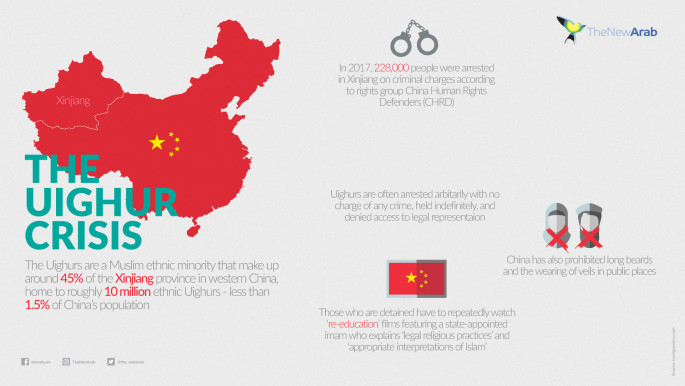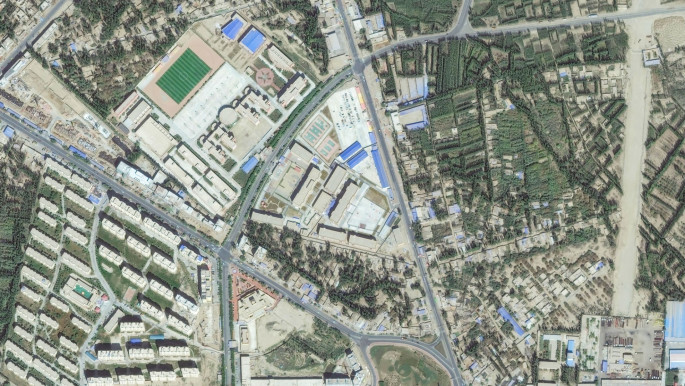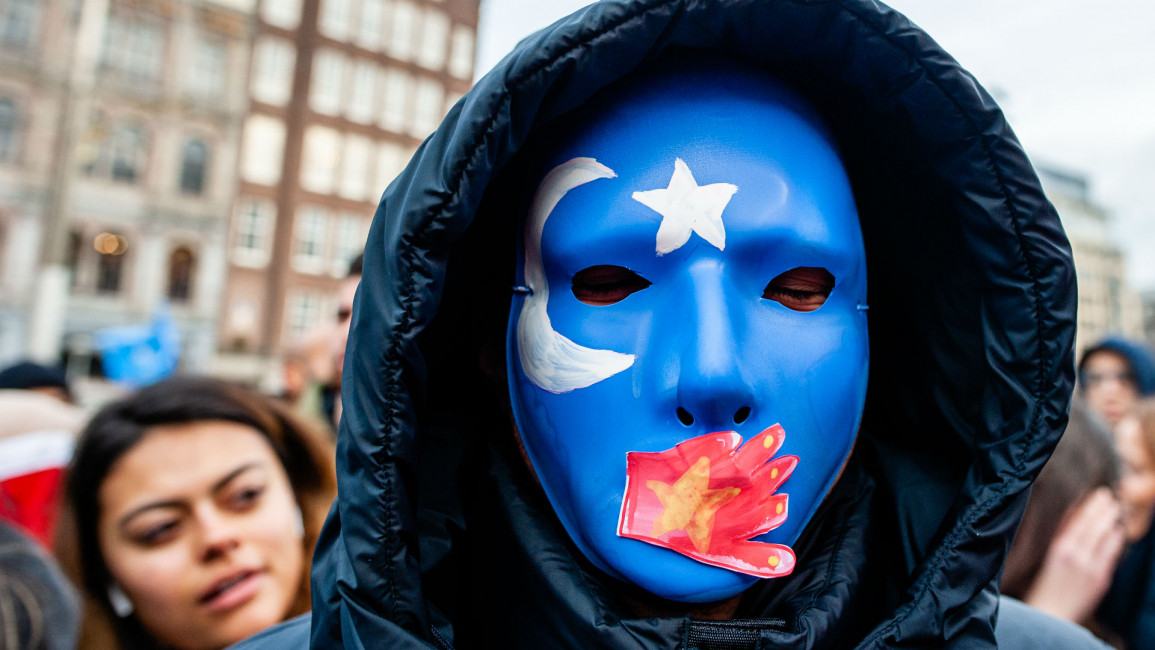China's appalling and systematic mistreatment of Uighurs exposed in new Xinjiang leak
The leak shows that one man had been arrested and forced into an internment camp - reluctantly dubbed "re-education" camps by China - simply for growing a beard and because his wife chose to wear a veil.
The database obtained by the AP shows the internment of 311 individuals with relatives abroad and lists information on more than 2,000 of their relatives, neighbours and friends, demonstrating in stark detail the state's use of surveillance tactics on its civilians.
Each entry includes the detainee's name, address, national identity number, detention date and location, along with a detailed dossier on their family, religious and neighbourhood background, the reason for detention, and a decision on whether or not to release them.
Issued within the past year, the documents do not indicate which government department compiled them or for whom.
Taken as a whole, the information offers the fullest and most personal view yet into how Chinese officials decided who to detain and who to release in the camps, as part of a massive crackdown that has locked away more than a million ethnic and religious minorities, mostly Muslims.
The database emphasises that the Chinese government focused on religion as a reason for detention - not just political extremism, as authorities claim, but for ordinary activities such as praying, attending a mosque and growing a beard.
It also shows the role of family: People with detained relatives are far more likely to end up in a camp themselves, uprooting and criminalising entire families like Emer's in the process.
Similarly, family background and attitude is a bigger factor than detainee behaviour in why they are released.
"It's very clear that religious practice is being targeted," said Darren Byler, a University of Colorado researcher studying the use of surveillance technology in Xinjiang.
"They want to fragment society, to pull the families apart and make them much more vulnerable to retraining and reeducation."
Asked whether Xinjiang is targeting religious people and their families, foreign ministry spokesman Geng Shuang said "this kind of nonsense is not worth commenting on".
Read More: Stop Uighur internment camps or take the Olympics away from China
The government long denied the existence of such camps.
In the wake of overwhelming evidence, it eventually admitted to the existence of "re-education" camps, insisting that such entities were created to tackle extremism and for voluntary job training, despite the fact that ordinary citizens are being targeted.
With the 9/11 attacks in the US, officials began using the spectre of terrorism to justify harsher religious restrictions, saying young Uighurs were susceptible to Islamic extremism.
After militants set off bombs at a train station in Xinjiang's capital in 2014, President Xi Jinping launched a so-called "People's War on Terror", transforming Xinjiang into a digital police state.
The leak of the database from sources in the Uighur exile community follows the release in November of a classified blueprint on how the mass detention system really works.
The blueprint obtained by the International Consortium of Investigative Journalists, which includes the AP, showed that the centres are in fact forced ideological and behavioural re-education camps run in secret.
Another set of documents leaked to The New York Times late last year revealed the historical lead-up to the mass detention.
 |
The latest set of documents came from sources in the Uighur exile community, and the most recent date mentioned is March 2019.
The detainees listed come from Karakax County, a traditional settlement of about 650,000 on the edge of Xinjiang's Taklamakan Desert where more than 97 percent of residents are Uighur.
The list was corroborated through interviews with former Karakax residents, Chinese identity verification tools, and other lists and documents seen by the AP.
Detainees and their families are tracked and classified by rigid, well-defined categories.
Households are designated as "trustworthy" or "not trustworthy", and their attitudes are graded as "ordinary" or "good".
Families have "light" or "heavy" religious atmospheres, and the database keeps count of how many relatives of each detainee are locked in prison or sent to a "training centre".
Officials used these categories to determine how suspicious a person was - even if they hadn't committed any crimes.
"It underscores the witch-hunt mindset of the government, and how the government criminalises everything," said Adrian Zenz, an expert on the detention centres and senior fellow at the Victims of Communism Memorial Foundation in Washington, DC.
Reasons listed for internment include "minor religious infection", "disturbs other persons by visiting them without reasons", "relatives abroad", "thinking is hard to grasp" and "untrustworthy person born in a certain decade".
The last seems to refer to younger men; about 31 percent of people considered "untrustworthy" were in the age bracket of 25 to 29 years, according to an analysis of the data by Zenz.
A well-known imam in Xinjiang called Memtimin Emer was one of hundreds to be taken.
Though Emer, who is in his eighties, gave Party-approved sermons and refused to preach Communist propaganda, and eventually ran into trouble with the authorities.
He was stripped of his position as an imam and barred from teaching in 1997, amid unrest roiling the region.
 |
| Maxar satellite imagery of a re-education internment camp in Hotan, Xinjiang [Getty] |
He stopped teaching but was still detained and sentenced on various charges for up to 12 years in prison over 2017 and 2018.
The database cites four charges in various entries: "stirring up terrorism", acting as an unauthorised "wild" imam, following the strict Wahhabi interpretation of Islam and conducting illegal religious teachings.
"He used to always preach against violence," Muhammad, one of his students, said. "Anyone who knew him can testify that he wasn’t a religious extremist."
None of Emer's three sons had been convicted of a crime. But the database shows that over the course of 2017, all were thrown into the detention camps for having too many children, trying to travel abroad, being "untrustworthy" or "infected with religious extremism", "or going on the Hajj", the Muslim pilgrimage to the holy city of Mecca.
It also shows that their relation to Emer and their religious background was enough to convince officials they were too dangerous to let out from the detention camps.
The database indicates much of this information is collected by teams of cadres stationed at mosques, sent to visit homes and posted in communities.
This information is then compiled in a dossier called the "three circles", encompassing their relatives, community, and religious background.
It wasn't just religious observers who were detained.
The database shows that Karakax officials also explicitly targeted people for activities that included going abroad, getting a passport or installing foreign software.
Pharmacist Tohti Himit was detained in a camp for visiting 26 "key" countries, mostly Muslim, according to the database.
Former employee Habibullah, who is now in Turkey, recalled Himit as a secular, kind and wealthy man who kept his face free of a beard.
"He wasn't very pious, he didn't go to the mosque," said Habibullah, who declined to give his first name out of fear of retribution against family still in China. "I was shocked by how absurd the reasons for detention were."
The database says cadres found Himit had attended his grandfather's funeral at a local mosque on 10 March 2008.
Later that year, the cadres found, he had gone to the same mosque again, once to worship and once to celebrate a religious festival.
In 2014 he had gone to Anhui province, in inner China, to get a passport and go abroad.
That, the government concluded, was enough to show that Himit was "certainly dangerous".
They ordered Himit to stay in the centres and "continue training".
Emer is now under house arrest due to health issues, his former student, Muhammad, has heard. It's unclear where Emer's sons are.
Follow us on Facebook, Twitter and Instagram to stay connected



